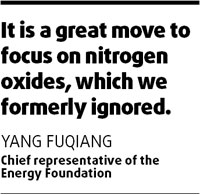All five power plants in Beijing are set to slash emissions in a bid to clean up the skies in time for the Olympic Games in August, local media have reported.
The power plants, fueled mainly by coal, together provide a third of Beijing's electricity and all of its thermal energy.
Local media said the Huaneng Beijing Thermal Power Plant, 15 km east of downtown Beijing, has put in place a nitrogen oxide reduction system that will reduce its nitrogen oxide emissions by 75 percent, or 10,000 tons a year.
Nitrogen oxides are found mainly in industrial waste and car emissions.
Environmental experts told China Daily that nitrogen oxide density is not a major factor in the country's air quality indexes, but Beijing authorities seem determined to clean up the capital's skies so that athletes can breathe easy during the Games.
"It is a great move to focus on nitrogen oxides, which we formerly ignored," Yang Fuqiang, chief representative of the United States-based Energy Foundation in Beijing, said.
"We used to tackle only sulfur dioxide and particles in the air. Focusing on nitrogen oxide emissions from industrial plants, a major source of pollution, is both an effective and an economical strategy," he said.
The Huaneng plant, which is located just 1 km from residential areas, provides about 10 percent of Beijing's daily electricity and is also the city's largest supplier of thermal energy.
The capital's four other plants will also curb their nitrogen oxide emissions over the coming months, local newspapers reported.
All five plants reduced sulfur dioxide emissions, a major air pollutant, last year.
Beijing authorities are expected to limit emissions within a 500 km radius of the city this year.
The designers of the Huaneng plant told China Daily they have been working on 13 environment projects in the vicinity of the capital, including Hebei Province and Tianjin Municipality.
Two-thirds of Beijing's electricity comes from neighboring regions, including Shanxi Province and the Inner Mongolia Autonomous Region.
Beijing will almost definitely reduce the number of vehicles on its roads and suspend production at coal-burning power plants about two months before the start of the Games.
More than 1,000 gas stations in Beijing are also reportedly being retrofitted to curb petroleum vaporization, while stricter fuel standards were adopted on Tuesday in line with the Euro IV standard.
Zhu Jimin, chairman of Beijing's steel giant Shougang, said in October the company is willing to halt production for three months this summer.
However, officials from chemical and power plants in Beijing said they have no plans to shut down the plants for the Games.
"Certainly we support government plans to clean up the air because the Olympics is an exceptional event," Ma Chenghua, a senior manager with Beijing Yanshan Petrochemical Co, said.
"However, although Beijing can afford to stop steel production, it can't do without the gasoline needed to keep the city operating."
(China Daily January 3, 2008)






